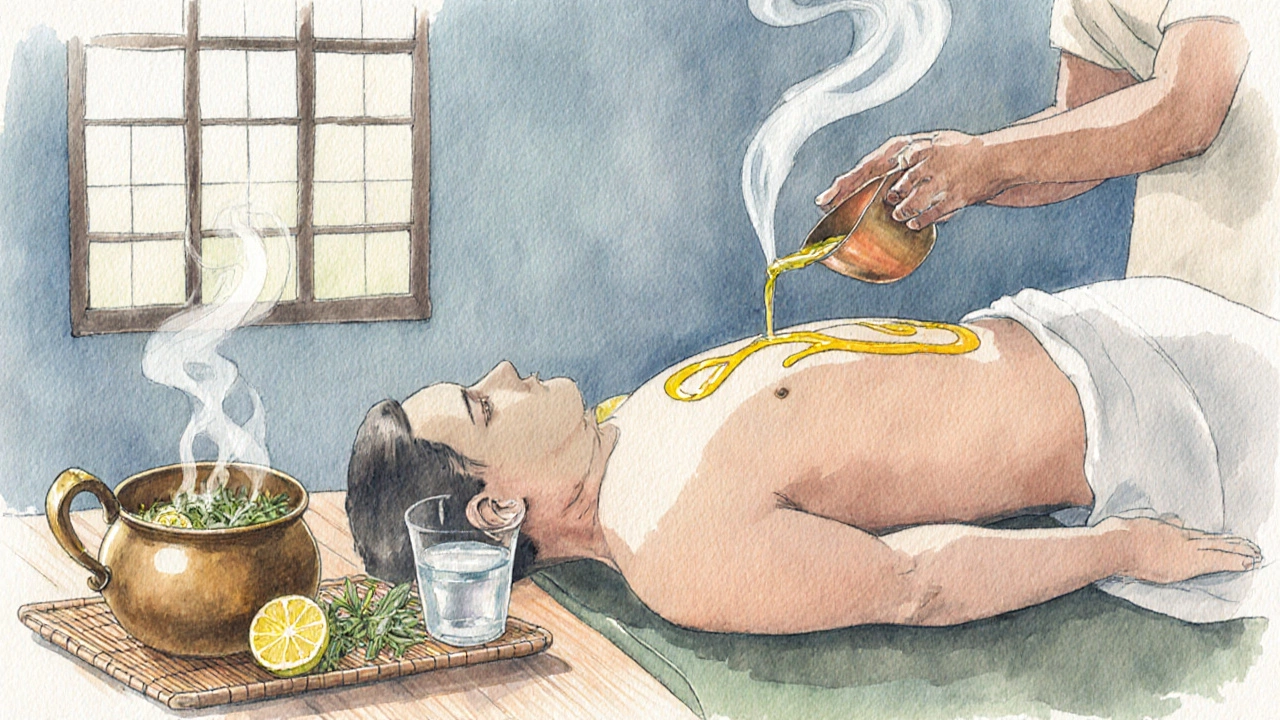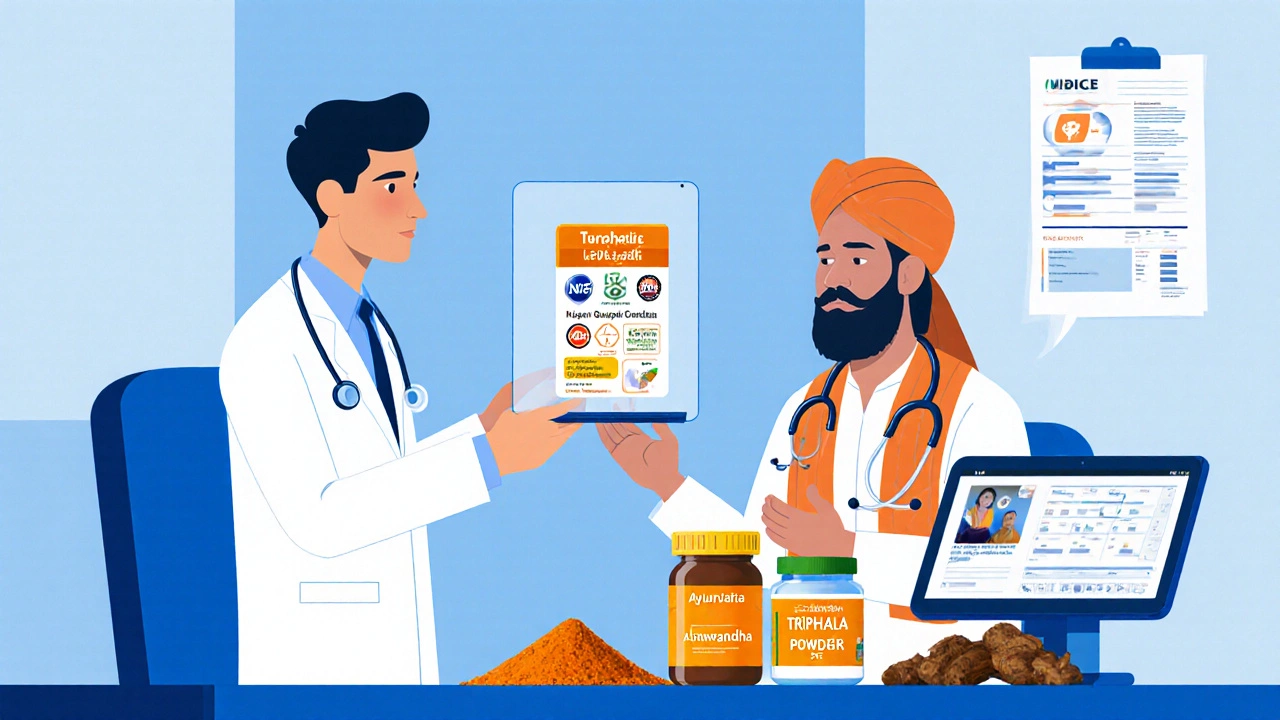
Ayurveda: Benefits, Risks, and Safety Guide
Ayurveda Dosha Quiz
Answer the following questions to discover your primary Ayurvedic dosha (Vata, Pitta, or Kapha). This quiz is for educational purposes only and should not replace consultation with a qualified Ayurvedic practitioner.
Your Ayurvedic Dosha
Characteristics
Balancing Tips
Quick Takeaways
- Ayurveda is a holistic system from India that focuses on balance of body‑mind‑spirit.
- Evidence supports benefits for stress, inflammation, and metabolic health, but rigorous trials are limited.
- Potential risks include herb‑drug interactions, contamination, and misuse of high‑dose preparations.
- Choose certified products, qualified practitioners, and always discuss with your primary doctor.
- When used responsibly, Ayurveda can complement modern care rather than replace it.
When you see headlines asking if Ayurveda is good or bad, the answer isn’t black‑and‑white. The ancient practice offers a toolbox of diet, lifestyle, and herbal strategies that can boost wellness, yet it also carries safety gaps that modern users must navigate.
What Is Ayurveda?
Ayurveda is a traditional Indian system of holistic health that aims to balance the three doshas-Vata, Pitta, and Kapha-through diet, herbs, massage, and mindfulness. It dates back over 5,000years and is recognized by the WHO as a form of traditional medicine.
Modern practitioners translate its concepts into "Ayurvedic medicine"-a term that appears on supplement labels, wellness blogs, and boutique clinics worldwide.
Core Concepts: Doshas and Panchakarma
The cornerstone of Ayurveda is the dosha system. Each person has a unique constitution, a blend of Vata (air‑earth), Pitta (fire‑water), and Kapha (water‑earth). When one dosha dominates, symptoms such as anxiety, acid reflux, or joint stiffness may surface.
Therapeutic cleansing called Panchakarma uses oil massages, herbal steam, and guided fasting to reset the doshas. Clinical reports from Indian hospitals note that a 5‑day Panchakarma cycle can lower cortisol by up to 15% in stressed volunteers, but the studies are small and lack long‑term follow‑up.

Evidence‑Backed Ayurveda benefits
Here are the areas where research, albeit limited, points to real advantages:
- Stress reduction: Ashwagandha (Withania somnifera) has been shown in double‑blind trials to cut the Perceived Stress Scale score by 30% after eight weeks of 300mg daily.
- Anti‑inflammatory action: Curcumin, the active compound in Turmeric, reduces C‑reactive protein by an average of 1.2mg/L in arthritic patients when taken with piperine.
- Metabolic support: Triphala, a blend of three fruits, improves fasting glucose by 0.4mmol/L in pre‑diabetic adults after 12 weeks.
- Digestive health: Jiva‑Kshara (alkaline herbal preparations) have modest efficacy in functional dyspepsia, comparable to low‑dose proton‑pump inhibitors.
While these findings are promising, most studies involve small sample sizes, short durations, and often lack placebo controls. That’s why Ayurveda is best viewed as a complementary approach rather than a standalone cure.
Potential Risks and Interactions
Even natural herbs can cause trouble:
- Herb‑drug interactions: St. John’s wort‑like constituents in certain Ayurvedic formulas can accelerate the metabolism of blood thinners, antidepressants, and birth control pills.
- Heavy‑metal contamination: A 2023 WHO survey found that 12% of unregulated Ayurvedic powders contained lead or mercury above safety limits, often due to traditional metallic preparations (bhasmas).
- Allergic reactions: Neem oil and some essential oils may trigger dermatitis in sensitive skin.
- Over‑dosage: High‑dose Ashwagandha can lower thyroid hormone levels, worsening hypothyroidism.
The U.S. Food and Drug Administration (FDA) does not pre‑approve herbal supplements, so quality varies widely.
Choosing Safe Ayurvedic Products
- Look for third‑party testing (e.g., USP, NSF) that verifies purity and absence of heavy metals.
- Prefer products from manufacturers that follow Good Manufacturing Practices (GMP).
- Check for Clear dosage instructions; avoid “proprietary blends” that hide exact amounts.
- Consult a licensed Ayurvedic practitioner who holds a recognized qualification (e.g., BAMS, MD in Ayurveda) and can tailor doshas.
- Discuss any new supplement with your primary care doctor, especially if you’re on prescription meds.

Integrating Ayurveda with Modern Medicine
The most sensible path is a hybrid model:
- Use Ayurvedic diet principles (e.g., warm, cooked meals for Vata) as a baseline nutrition plan.
- Employ specific herbs like Turmeric as adjuncts to standard anti‑inflammatory regimens, under medical guidance.
- Reserve intensive Panchakarma cleanses for periods when you’re not undergoing surgery, chemotherapy, or other invasive treatments.
Document any complementary regimen in your medical record; this helps clinicians monitor for interactions and adjust dosages.
Bottom Line: Is Ayurveda Good or Bad?
Ayurveda isn’t a universal remedy, but it isn’t a danger zone either-provided you respect its limits. The practice shines when it offers gentle lifestyle tweaks, stress‑relief herbs, and personalized diet advice. It can backfire when low‑quality supplements are used, or when patients replace proven pharmaceuticals with untested remedies.
So, the answer to “Is Ayurveda good or bad for you?” is: it can be goodif you choose reputable sources, stay informed about potential risks, and keep your primary physician in the loop.
| Aspect | Potential Benefit | Potential Risk | Evidence Level |
|---|---|---|---|
| Stress Management | Reduced cortisol, improved sleep | Placebo‑controlled data limited | Moderate (small RCTs) |
| Anti‑inflammation | Lower CRP, joint pain relief | Possible GI upset, herb‑drug interaction | Moderate (meta‑analysis of curcumin) |
| Metabolic Health | Improved fasting glucose, lipid profile | Contamination with heavy metals | Low (pilot studies) |
| Detox/Cleansing (Panchakarma) | Dosha rebalance, temporary weight loss | Electrolyte imbalance if unsupervised | Low (case series) |
| Herbal Supplements | Targeted nutrient support | Allergic reactions, dosage variability | Variable (depends on herb) |
Frequently Asked Questions
Can Ayurveda replace my prescription medication?
No. Ayurvedic herbs and therapies can support health, but they have not been proven to cure chronic diseases. Always keep your prescribed meds unless a doctor advises otherwise.
Is it safe to take Ayurvedic herbs while pregnant?
Many herbs, such as Ashwagandha, are not recommended during pregnancy because they may affect hormone levels. Consult an obstetrician before using any supplement.
How can I verify the purity of an Ayurvedic supplement?
Check for third‑party lab reports (USP, NSF) that list heavy‑metal testing and exact ingredient percentages. Certifications like GMP also signal higher manufacturing standards.
What is the best way to identify my dosha?
A qualified Ayurvedic practitioner will assess your pulse, tongue, skin, and questionnaire responses to determine your dominant dosha and recommend personalized lifestyle tweaks.
Are there any Ayurvedic treatments backed by large clinical trials?
Curcumin (from Turmeric) has the largest evidence base, with several meta‑analyses showing modest anti‑inflammatory effects. Other treatments mostly rely on smaller pilot studies.

Arnav Singh
I am a health expert with a focus on medicine-related topics in India. My work involves researching and writing articles that aim to inform and educate readers about health and wellness practices. I enjoy exploring the intersections of traditional and modern medicine and how they impact healthcare in the Indian context. Writing for various health magazines and platforms allows me to share my insights with a wider audience.
About
Medical Resource Center India is a comprehensive online platform dedicated to providing reliable health information and medical resources in India. Explore a wide range of articles, tips, and advice on medicine, healthcare services, and wellness. Stay informed about the latest developments in Indian medicine and access valuable insights into maintaining a healthy lifestyle. Discover expert guidance and health solutions tailored for every Indian citizen. Your go-to destination for authoritative medical knowledge in India.


